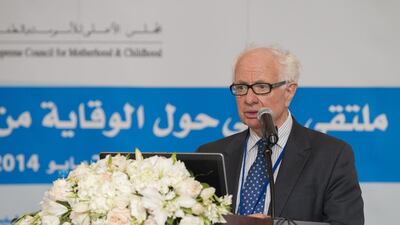ABU DHABI // A strict no-bullying policy must be implemented in schools, experts say.
The suggestion came at a “prevention of bullying in school” seminar on Wednesday that discussed violence in schools and ways to prevent it.
Delegates also called for parents and teachers to talk to each other and said the whole community must act to stop this behaviour.
“If the behaviour goes on repeatedly, day after day, that separates it from simple aggression,” said Ken Rigby, an adjunct professor at the School of Education and Hawke Research Institute at the University of South Australia.
Bullying is caused by a “desire to put someone under stress”, he said. “This desire is to humiliate. Bullying is a mixture of behaviour and desire.”
Teasing, ignoring, gesturing or physically injuring someone is considered bullying, he said.
The bully will target a victim who is of different ethnicity, religion or social class to intimidate. The bully will also target anyone they are annoyed with or envy.
He said children who feel they are unloved or too controlled by their parents are more likely to behave as a bully. Prof Rigby said bullying was more likely to take place in schools for several reasons.
“Teachers don’t care and are not managing their classes. There is no supervision on the playground and children don’t know how to deal with bullying,” he said.
Another reason for bullying is lack of communication between the school and parents, Prof Rigby said.
Teachers and parents should also communicate with the students to ensure they are not harmed and to encourage students to speak out.
“The whole of the community is responsible,” he said.
An implementation team of teachers, a student representative and parent representatives is needed, said Prof Rigby.
“Schools need plans, a documented policy. Everyone should get a copy,” he said.
Also attending the seminar was Dr Marlene Snyder, director of development for the Olweus Bullying Prevention Programme (OBPP) in the United States. Dr Snyder said she was disheartened to know that most bullying takes place in the classroom “with teachers present”.
“Bullying is a human behaviour. We need to know how to deal with it on a day-to-day basis.”
Dr Snyder said it was important to encourage long-term change. The impact of bullying has a lingering effect and children who are not helped will feel “hopeless and do contemplate suicide”.
The community must get together to give the children a message, along with the schools, she said.
According to Dr Snyder, the OBPP programme creates a welcoming social environment.
It requires adults to be role models, set firm limits of unacceptable behaviour and have consequences that are not psychical or negative.
Consequences should provide “an opportunity for the child to develop better behaviour”, Dr Snyder said.
Suspension and expulsion from school are not effective, instead, students must learn how to replace their behaviours with good ones.
The seminar aims to bring together successful models in the field of anti-bullying among peers in schools and then to develop a model suitable for the Gulf region.
Attending the seminar were educational experts, teachers and parents. It was held in the General Women’s Union in the capital and concludes on Thursday.
aalkhoori@thenational.ae

